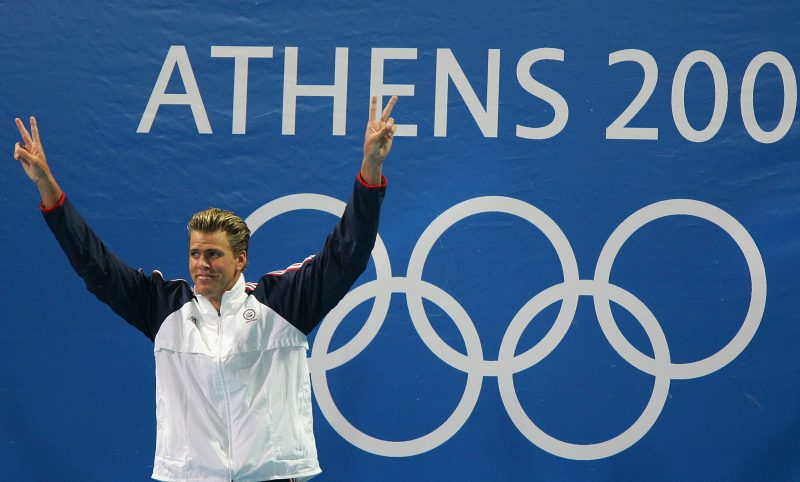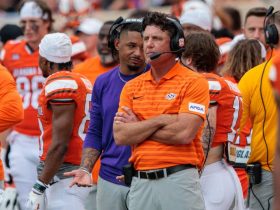BERKELEY, Calif. — There was a point earlier this year, after his house — along with his livelihood and his worldly possessions — had vanished in a fiery blaze, when Gary Hall Jr. perhaps fully realized why he was a swimmer.
“Sport is not life or death,” the five-time Olympic gold medalist told USA TODAY Sports. “It’s entertainment. It really is, even at the Olympics. You’ve got so much invested by then. But still, at the end of the day, the world’s not a better place because I swam fast.”
He was sitting at a picnic table under a tent at the Project Play Summit. Coaches and leaders from across the youth sports landscape traveled to the University of California in late March in search of ways to keep kids playing amid what has become a $40 billion industry that often pushes them out.
Hall, 50, was a late bloomer in a simpler era. He didn’t join a year-round swimming program until he was 13 or 14. Less than 10 years later, his long and graceful body climbed to the top of the podium at the first of his three Olympics (1996, 2000, 2004) representing the United States.
He had fun with talking trash to opponents to the point where it motivated an entire nation to want to beat him.
Today, he is putting his life back together while living in a guest house near his sister’s home in Encinitas, California. His swim school, where he taught 2-to-6-year-olds out of his backyard pool in Pacific Palisades, vanished, too, that day in January as wildfires ravaged Los Angeles.
A father of two teenagers who have played sports, Hall Jr. spoke to USA TODAY Sports about his athletic journey and how looking back at it could be helpful to young athletes and their parents.
He pulled out what remained of two gold medals he recovered from the fire — one from Atlanta, one from Athens. They were now melted together. This could be lesson No. 1.
‘Success,” he says, “was a very humbling experience.”
‘Extreme’ sports: Our environment (and our parents) offer us an athletic path; we decide how to navigate it
When he was winning medals, Hall used to wear silk boxing robes to the pool deck. He was poking fun at ego and convention. He had done it since he was a boy and Olympians would come to his local pool club to give motivational talks to him and his teammates.
“I was rolling my eyes, like, ‘Yeah, OK, character development,’” he said.
As a teenager, he wanted to be more like Tony Hawk than his father, three-time Olympic medalist Gary Hall Sr.
Hall Sr. was as a swimmer in the 1968, 1972 and 1976 Olympics, and a two-time world swimmer of the year. Hawk was a pioneer of skateboarding, much more a fad in the 1980s than the crossover Olympic sport it is today.
‘To my dad, it was just a bunch of punk kids, which I loved about it,” Hall Jr. said. “People asked, ‘Do you want to follow in your father’s footsteps?’ No, to a certain degree, I took it for granted.”
Hall’s grandfather, Charles Keating Jr., was a collegiate swimming champion. Keating built a swim facility where Hall’s parents met. He built another swim club in Phoenix, where the family moved when Hall was seven.
There, the temperatures reached 120 degrees in the summer. Skateboarding lasted 15 or 20 minutes before Gary and his friends wound up in the water.
“It was almost because of extreme climate that I ended up being a swimmer,” he said. “And once we were in the pool, I was always, you know, ‘I’ll race you from here to there.’ ’’
That surge of adrenaline he got going head to head against a competitor became enough of a carrot to sustain him within a grueling sport.
“You spend the entire year training for one big meet,” Hall said. “So the work-race balance is substantial, but it didn’t matter. I loved that 1% of the sport, the race part.”
‘Smash them like guitars’: When the competition becomes fun
Hall said his father never really taught him how to do a better flip turn or reviewed his races with him. He mostly just told his son to enjoy himself.
Hall understood the advice when he watched footage of his dad behind the starting blocks as a highly-touted Olympian. His knee was bouncing up and down and the blood appeared to have drained from his face.
“He’s just not having fun,” Hall said, “and so what I interpreted was to be present, enjoy the atmosphere, the experience. And stress is a big part of that, and anxiety before the race and feeling sick to my stomach. And you just learn how to accept that as part of the overall experience.
“But really, I think it became a great attribute of mine that I had an ability to be present.”
Each moment, he observed, whether you were lined up and ready to race or hanging out with your teammates, was a unique opportunity to relish.
“There’s plenty of towel snapping in the locker rooms and trash-talking as a skinny, no good high school swimmer,” Hall said, his smile and bright blue eyes widening. “And I didn’t get good until the end of high school, so swimming at an elite level wasn’t even a consideration.”
As it all unfolded — the strong meet that led to a chance to swim at the university of Texas, the breakthrough that led him to the world championships and the 1996 Olympics — Hall Jr. became known as a showman.
Before and after an Olympic win, he might wear a cape and shoot his arms up in the air in mock deference to Randy “Macho Man” Savage, the wrestler he watched on TV as a boy.
Before a highly-anticipated 4×100 relay race with Australia at the 2000 Olympics in Sydney, he said very publicly: ‘My biased opinion says that we will smash them like guitars.”
Swimming the last leg, he fell just short to Australian Ian Thorpe and the U.S. lost.
“Any Australian I ever will meet will want to talk about that relay and remind me that the Australians won that night,” Hall said. “And what a great race.”
Despite being diagnosed with Type 1 diabetes the year before, Hall won two gold medals at those Olympics. But when Hall won silver, one of the Australian swimmers recalled how he was the first American to congratulate them.
All these years later, after he barely made it out of his house with his dog and his insulin, Hall heard from Thorpe.
“He was the third person that texted me, that reached out to me,” Hall said. ‘Two others just before him were family members. I’m wondering, how he found out before anybody? He’s got an eye in the sky or something.
“But I mean that is also a great symbol of this sport. That this was an intense rival, but that bond that sport created has endured through tough wins, tough losses on both sides.”
‘There’s no one one size fits all’: Embrace what your kid loves to do
Hall used to look around the Phoenix Swim Club, and watch those parents, the ones who screamed and whose veins seemed to bulge out of their foreheads. You have likely seen them.
“The amount of pressure that I saw those kids endure was devastating,” he said. “These kids really did great early on, and by high school they were just so burnt out, and there was no fun in it. And so I never wanted to put pressure on my kids when they came around.
“The tricky thing about this is that there is no one size fits all. There’s some kids that don’t need to be pushed, that are highly motivated and just are pushing themselves and want to be great, and other kids that just want to scroll, and so we’re dealing with psychology.”
“Take it easy,” he says. “Be a cheerleader, not a coach.’
Coach Steve: How phones are ‘tanking’ youth athletes’ mental game
His daughter, Gigi, joined the high school swim team as a freshman — “swimming lite,” Hall said — swam for three years and now has a $17,000 scholarship to Savannah College of Art and Design.
“She’s an artist, creative type, and I love that about her, but never had the killer instinct that would drive you to real success at sport,” he said. “And totally OK with that.”
‘He’s training 10 times, 11 times a week and getting in extra workouts,’ Hall said. ‘He wants it, he’s chasing it.
‘It can be done but it takes the right environment. I was fortunate more than any genetic inheritance to be in that swim club environment. They brought in great coaches. They knew what they were doing from running generations of youth sport programming. And if you don’t have that, you’re not gonna make it.’
There is no club swim team in Charlie’s area of Santa Barbara County. He has to drive himself 45 minutes to get to practice, illustrating another issue confronting youth sports.
The goal of Project Play is to provide kids with more access to sports across the country and have 63% youth sports participation nationwide by 2030. We are currently at 54%.
There are needs for facilities and programs — both competitive and participatory — but also financial needs for kids who can’t afford access. A major drive to meet the goal will be corporate partnerships, a point of emphasis at the Project Play Summit.
Little League Baseball, for example, has a grant program with T-Mobile to help families seek help with registration fees, even those who can’t pay for all of their kids to play.
“We’re deploying a lot of educational resources: How to work with all kids, not just the best kids, not just your kid, but all kids,” Little League Baseball president and CEO Patrick Wilson told USA TODAY Sports. “Even if you don’t play that sport in high school, even if it’s your second sport, it’s still good because it’ll help you. All those lessons you learn by not being the top dog. Because the reality is, there will be a time in life when you’re not at the top.”
As Hall learned, whether you are at the top is also a matter of perspective.
Character traits learned in youth sports stay with you
Hall knew the fierce winds were coming that day in January. He woke up to the sound of his pool cover flapping and spent 45 minutes wrestling it back into place. He was on a phone call with his scheduler when he saw a little smoke out a back window.
A little more than 10 minutes later, he saw flames and baseball-sized embers plunging down the hill toward him and other houses starting to catch fire. He had only a few minutes to get out.
“People that do well in sport, it builds this kind of characteristic: it is remaining calm in chaos and clear headed,” he told the crowd at Project Play. “And my response was extremely pragmatic. I felt like I knew it was time to go. Knew that I was abandoning everything, that it was unlikely that I would see any of it again, and just did what had to be done.”
As Hall tries to rebuild his swim school, he is working on a sports betting platform for swimming, which he hopes to open up to all Olympic sports. He says a percentage of his potential earnings is earmarked for rebuilding youth sport programming in west Los Angeles.
He has seen first-hand the transformative power of sports. He has gone from brash kid and athlete to understated parent and teacher. All of it has come on his own terms, shaping his life, and perhaps even saving it.
“It wasn’t until later in life when you face obstacles like your house burning down, and everything you own and your business disappearing overnight, that those character traits that I learned as a 14-year-old in sport shine and allow me to process something like this in a totally different way that counterparts aren’t able to,” he said. ‘And so I am extremely grateful for my sport experience.
‘I know that I wouldn’t be handling this situation that I’m currently in the same way if I hadn’t been through that.’
The 10 Olympic medals he won are beside the point. They are mostly gone now, anyway.
Steve Borelli, aka Coach Steve, has been an editor and writer with USA TODAY since 1999. He spent 10 years coaching his two sons’ baseball and basketball teams. He and his wife, Colleen, are now sports parents for two high schoolers. His column is posted weekly. For his past columns, click here.







